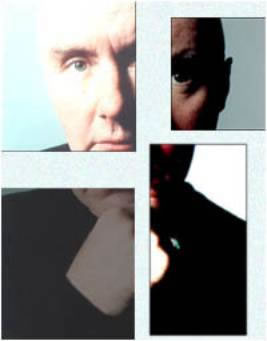 If you put four dwarfs in one room with enough opium and alcohol, it's bound to end in tears...In 1935, MGM studios embarked on a movie adaptation of L. Frank Baum's "The Wonderful Wizard of Oz". The production called for the casting of many dwarfs to play the Munchkins of the mythical Land of Oz and the studio began recruiting 'small persons' from all over the world. During production, rumours spread around Hollywood of wild Munchkin sex orgies, drunken behaviour and general dwarf debauchery. More sinisterly, a Munchkin is said to have committed suicide by hanging himself on the set during filming - what appears to be a small human body is clearly visible hanging from a tree in the Tin Woodman scene.
If you put four dwarfs in one room with enough opium and alcohol, it's bound to end in tears...In 1935, MGM studios embarked on a movie adaptation of L. Frank Baum's "The Wonderful Wizard of Oz". The production called for the casting of many dwarfs to play the Munchkins of the mythical Land of Oz and the studio began recruiting 'small persons' from all over the world. During production, rumours spread around Hollywood of wild Munchkin sex orgies, drunken behaviour and general dwarf debauchery. More sinisterly, a Munchkin is said to have committed suicide by hanging himself on the set during filming - what appears to be a small human body is clearly visible hanging from a tree in the Tin Woodman scene. It is a claim that has passed into Hollywood legend. Set in a hotel room in Culver City, California, "Babylon Heights" is Irvine Welsh and Dean Cavanagh's scabrous and hilarious imagining of what could, very possibly, have led to that dwarf suicide. "Babylon Heights" is premiered at the Exit Theatre, San Francisco, in June 2006 and is published by Vintage in the UK and Norton in the US.
ZANI -How did the idea come about?
Dean Cavanagh - I’ve always found the film (Wizard of Oz) intriguing. There’s a lot of symbolism in it and I think it works on various levels. Essentially it’s about finding your way back home, but there’s so much more going on. Obviously it’s a classic piece of cinema, probably the most famous film of all time. You’d be hard pressed to find anybody who hasn’t seen it and because of that it’s entered into the collective unconsciousness.
For that reason alone I think it’s worthwhile to explore the picture. Also, I’m a big fan of Robert Anton Wilson (The Illuminati Trology, Cosmic Trigger series) and in one of his books he says that his first real nightmare in life was when his parents took him to see the picture. He says that the scene where the Wicked Witch rides her broom through the sky and writes in smoke, “Surrender Dorothy” was traumatic for him and has stayed imprinted on his brain for over seventy years. I love shit like that. It’s cultural hypnosis.
Irvine Welsh - It’s such a cultural phenomenon. Film simply doesn’t hypnotise like it used to. Because the film’s become so famous it’s easy to write it off as a simple fairy tale, but it’s a highly charged piece of social commentary when you start to explore the themes. There’s a lot of shite written about the film, loads on the internet. This is something I just picked up off the net. It’s just one man’s interpretation but it highlights how much thought people put into it.
“What is "Oz" a symbol for? Ounces.
What is measured in ounces? Gold. What is the yellow brick road? Bricks or ingot bars of gold. The character known as the Straw Man represents that fictitious, ALL CAPS, legal fiction - a PERSON, the Federal U.S. Government created with the same spelling as your birth name. Remember what the Straw Man wanted from the Wizard of Oz? A Brain. No juristic person - legal fiction - paper corporation has a brain because he/she has no breath of life. What did he get in place of a brain?A certificate - a Birth Certificate for a new legal creation. He was proud of his new legal status, plus all the other legalisms he was granted. Now he becomes the epitome of the brainless sack of straw who was given a certificate in place of a grain of common sense.
Now, what about the Tin Man? Does Taxpayer Identification Number (TIN) recall anything to mind? The poor TIN Man just stood there mindlessly doing his work until his body literally froze up and stopped functioning. He worked himself to death because he had no heart nor soul. He's the heartless and emotionless creature robotically carrying out his daily task as though he were already dead. He's the ox pulling the plow and the mule toiling under the yoke. These days, his task masters just oil him nightly with beer and place him in front of a hypnotic television until his very existence no longer has any meaning or value.
His masters keep him cold on the outside and heartless on the inside in order to control any emotion or feeling that might arise.he Cowardly Lion was always too frightened to stand up for himself. Of course, he was a bully and a big mouth when it came to picking on those smaller than he. (Have you ever noticed how bullies are really the biggest cowards? They act as though they have great courage, but, in reality, have none at all. They roar, but with no teeth of authority to back them up.)
When push came to shove, the Cowardly Lion always buckled under and whimpered when anyone of any size or stature challenged him. He wanted courage from the Grand Wizard, so he was awarded a medal of "official" recognition. Now, although remaining a coward, his official status allowed him to be a bully, but with officially recognized authority. (He's not unlike the Attorneys who hide behind the Middle Courts of the Temple Bar.) et al ad infinitum.
What about the trip through the field of poppies? Did you notice how this had no narcotic effect on the Straw Man (no brain) or the Tin Man (no heart or soul)? They weren't real people, so drugs could not influence them. The Wizard of Oz was written at the turn of the century, so how could the author have known America was going to be drugged? The Crown has been playing the drug cartel game for centuries. Just look up the history of Hong Kong and the Opium Wars. The Crown already had valuable experience conquering all of China with drugs, so why not the rest of the world?
What was the Emerald City? The Federal Reserve System. Who finally exposed the Wizard for what he really was? Toto, the ugly (or cute, depending on your perspective) and somewhat annoying little dog. Toto means "in total, all together; Latin in toto." Notice how Toto was not scared of the Great Wizard's theatrics, yet he was so small in size, compared to the Wizard, that no one seemed to notice him? The smoke, flames and holographic images of Oz were designed to righten people into doing as the Great Wizard commanded.
Toto simply padded over, looked behind the curtain (the COURT, etc.), saw it was a scam, started barking until others paid attention to him and came to see what all the barking was about. Who was behind the curtain? Just an ORDINARY PERSON controlling the levers that created the illusion of the Great Wizard's power and authority. When Toto pulled back the curtain and completely exposed him, the charade was at an end. (The veil hiding the corporate legal fiction and its false courts was removed.) The Wizard's game was UP. What was he after all? ... a con-man. A FRAUD.
We can see, in this tale, just how loud the bark from a little dog can be. How about YOUR bark? How big is it? Most of us remain silent and wait to be given whatever food and recognition, if any, by our legal master. Let us not forget those pesky flying monkeys. What perfect mythical creatures to represent the Bar Association Attorneys who attack and control the little people for the Great Crown Wizard, the powerful and grand Bankers of Oz - GOLD.
How, finally, was the evil witch destroyed? .... pure, clean water LIQUIDATION. How, at last, did Dorothy get home? She simply clicked her heels. She always had the power, and SO DO WE. What would it take to expose the Wizard for what he is, tearing away his veils? We each need only a brain, a heart and soul --- and COURAGE. Then, and perhaps of the greatest importance, we need to learn HOW to WORK TOGETHER. Only "in TOTO," WORKING TOGETHER as ONE Body of the King of Kings.

ZANI -Can’t people read symbolism into any work of art though?
Dean Cavanagh - To a certain degree, yeah. I think what interests us though is taking such a big thing, culturally speaking, and putting our twist on it. I personally love the film and we haven’t set out to denigrate the genius of it in anyway. Critics and precious fans of the film might disagree with that one though. We’ll probably have some violent chapter of the Angels of Oz tracking us down and giving us a good kicking. Ha Ha…
Irvine Welsh - Whether Oz fascinates you or not, “Babylon Heights” is a stand-alone drama. People will probably start reading into the symbolism of it, which is a good thing. They can find correlations between “Babylon…” and the film. Gives you something to do, doesn’t it?
ZANI -I suppose so. Aren’t there some theories that contend the film was political?
Irvine Welsh - Francis MacDonell reckons that the picture is an allegory of the New Deal, you know, Roosevelt's program of social welfare to combat the hardship of the Great Depression in the 30’s. The lyricist on the film, Yip Harburg was a socialist and supporter of Roosevelt's policies and had written the lyrics to "Brother Can You Spare a Dime?" which was an anthem for the Great Depression.
Dean Cavanagh - I read something about the sexuality in the picture. Some Freudian guy reckons that Dorothy had witnessed the "primal scene". You know, she’d walked in on Auntie Em and Uncle Henry getting their rocks off. Dorothy then projects her anxiety about this event onto the real world in the form of a tornado.
ZANI -Isn’t the central premise of the play about exploring the urban legend of a Munchkin actually hanging himself on the set of the film?
Irvine Welsh - Yeah, but it’s also about the alienation these “little people” experienced when they were lumped together in Hollywood.
Dean Cavanagh - It’s fundamentally a comedic drama. It’s not trying to shore up the urban legend, it’s simply positing the question - did a munchkin top himself, and if so, what drove him to it.
Irvine Welsh - Nobody really knows what went on during the production. Big film studios are great at spin. They’re in the business of manufacturing imaginings aren’t they? This is just our imagining of what might have happened.
ZANI -The actors in the play are people of “normal” height aren’t they? Why not use “vertically challenged” people? Why are you using outsize sets to make the actors look small?
Irvine Welsh - It’s simply about empathy. We want the audience to have empathy with the characters. Some people will obviously have a problem with this.
ZANI -But surely there would be more empathy with the characters if they were actual small people?
Irvine Welsh - Maybe so, but it was written that way. The argument goes both ways though. Wouldn’t we be exploiting small people by having them play up to stereotype? The munchkins in the film were viewed by many – not least Judy Garland – as a necessary nuisance.
Dean Cavanagh - To be honest, I don’t give a fuck what the PC Brigade will say about it. Using “dwarfs” would be restrictive and it would also go against the grain of the surrealistic tone. The staging and dialogue is very stylised. It’s intended to create a world of its own, an Oz if you like, and I feel that by casting “dwarfs” it would lessen the effect.
ZANI -So you’re expecting a certain amount of criticism?
Irvine Welsh - Yeah. You can’t examine something as big as this without rattling people. The film means a lot to millions of people. A cult has sprung up around it.
Dean Cavanagh - One thing’s for certain, it’s not a boring play. That would be the worst thing anyone could say about it. It works on an entertainment level, first and foremost. The characters aren’t meant to be realistic. They are drawn to be “larger than life” no pun intended, but on one level they act realistic by constantly changing their minds, switching allegiances and making very contradictory statements.
They enter an alien world and start acting accordingly. Rather than going on big grand life altering journeys from the start of the play to the end, they are constantly changing, regressing and turning in on themselves and the others. If you study it you can see the mirroring of Dorothy, The Tin Man, The Cowardly Lion and The Straw Man in our characters, but like I say, you can either just enjoy as simply entertainment or you can try to read things into it and put your own theories onto it.
ZANI -Can you elaborate on what you mean about the characters journeys?
Dean Cavanagh - Huh, yeah. In drama, quite often, people talk about character arcs, like it’s some kind of holy grail catch all thing that you have to write onto, or rather, tag onto your characters, O.K.?
ZANI -Isn’t that called Aristotelian or something?
Dean Cavanagh - Whatever, it’s more like bollocks to me though. One of my favourite ever scenes in The Soprano’s is when Christopher is agonising over writing a screenplay. He’s read one of those bullshit “How To Write Screenplays” things, anyway, you must know the scene. (laughs thinking about it) Anyway right, Paulie Walnuts comes round and Christopher’s telling him about this character arc stuff. Paulie turns to Christopher and tells him that it’s all crap and that the only character who ever had an arc was Noah. Fucking genius. It’s bang on.
I think we’ve managed to build our characters without enforcing some kind of time related arc on them. Like I say, our characters in the play are all too human and they change by the minute not by the act.
ZANI -You usually collaborate on screenplays together. Why a play?
Irvine Welsh - Why not? The story suits theatre. Dean Cavanagh - You could actually make a film or TV version of it, but I doubt you’d be able to create the claustrophobic feel as effectively. Also, film and TV are notoriously slow and time consuming processes, not to mention highly collaborative and usually frustrating, waiting for fucking funding and taking reams of notes from everyone and their Cleaner. This is a story we wanted to tell from our perspective without interference.
ZANI -This is your second theatre play, Irvine. “You’ve Had Your Hole” was your first. You had a good experience with it then?
Irvine Welsh - Yeah. This is different though. It’s a completely different world. “Babylon…” was developed when I lived in America. I think a lot of that shines through. Plus it’s dealing with a history of sorts.
ZANI -We might be seeing another play from you two then?
Dean Cavanagh - I’d like to think so, but it all depends. You never know what’s around the corner. Essentially I think we both just want to tell good stories, be it theatrically or on film, or in Irv’s case books. A good tale is a good tale. I just want to carry on writing about things that interest me.
ZANI -You both have a lot of film projects at various stages of development. Anything either of you would like to talk about?
Dean Cavanagh - No, definitely not. It’s tempting fate and I’ve done it far too often in the past. Getting films made – for either screen or TV – in this country is a fucking nightmare. I’ve had a lot of bad experiences, and so too has Irv, which is criminal considering his proven track record.
ZANI -So I can’t draw you on it, Dean? That’s not like you.
Dean Cavanagh - Well, let’s just say that there’s a Hell of a lot of people getting good salaries in the UK for basically pissing on peoples creative output. It’s almost like a hierarchy of people employed to be naysayers. I’m not saying it’s different anywhere else in the world, it’s just that, from my experience, the UK film industry is a world leader in prevarication and crisis of confidence in judgement.
It used to annoy me more than it does now though. I’m beginning to realise that these people have very short shelf lives and crap careers, so there’s really no point in investing too much in their opinions. Certain people make things and certain people make salaries out of pretending to make things….fuck ‘em. Ha ha ha. By the way, talking about The Soprano’s, David Chase – fucking genius – had a nightmare getting it made. I wonder where all those pricks that said no to it are now, huh?
ZANI -Anything else in the pipeline that could prove to be controversial?
Dean Cavanagh - Irvine’s got his new novel, “The Bedroom Secrets of The Master Chef’s coming out later this year. Huh…there’s a thing we’ve written for Caroline Leddy at Channel 4 that’s interesting. She’s been really supportive. It’s being produced by Jemma Rodgers who did The League of Gentlemen. We’re also working with Katya Baker and Susan Pluckrose at Public Pictures.
We’re exploring quite a few unusual ideas with them, so yeah, it’s all ticking along. I don’t know about anything “controversial” though. You’ll be the first to know about it. Ha Ha…
ZANI -When are we going to get to see Babylon Heights in the UK?
Dean Cavanagh - It’s going to be performed in Dublin and Chicago later this year. I’d love to see it in London, Bradford or Manchester, but that’s all dependent on who picks up on it. We’ll just have to wait and see.
Many Thanks to Alan Black at The Edinburgh Castle Pub, San Francisco.
©Matteo Sedazzari /ZANI





